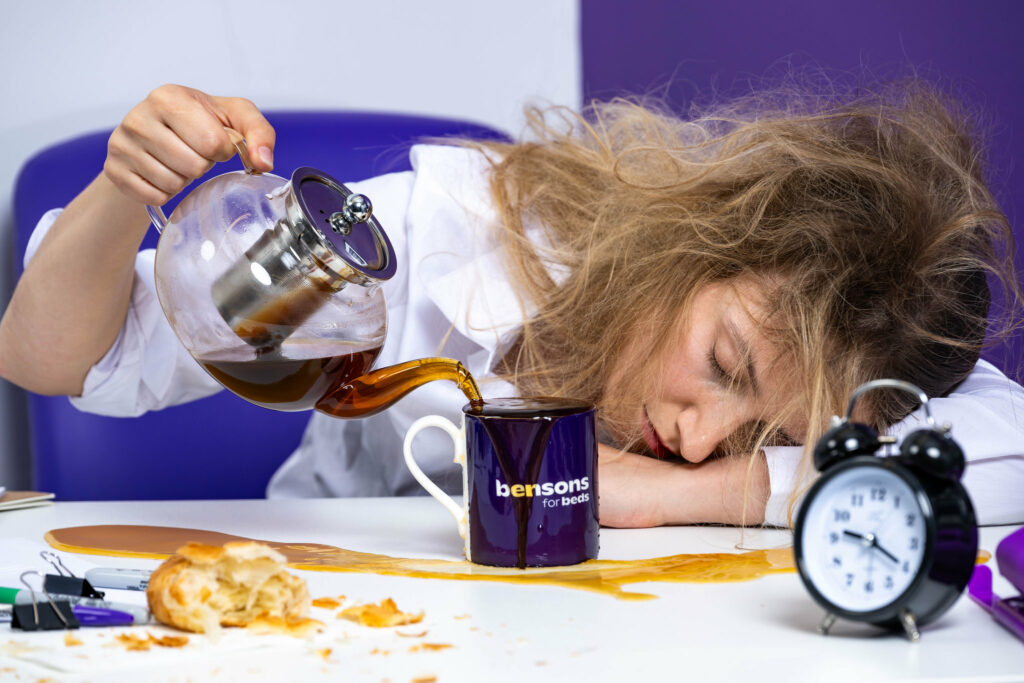National bed retailer Bensons for Beds has launched an exclusive 6-part programme to help combat the signs of being ‘TANGRY’ (tired and angry).
The survey of 2,000 Brits revealed that nine in 10 of us suffer from ‘Tangry’ behaviour – with 30 per cent claiming they constantly row with their partner because they feel exhausted in their daily lives. A further 18 per cent admit that they feel like a completely different person when they are tired.
30 per cent of irritable Brits confess they swear under their breath at everything when they’re worn-out, and the same number will burst into tears at the slightest thing.
Bensons, which commissioned the research, aims to combat this phenomenon, with the launch of ‘Sleep Calm and Carry On’ – a sleep improvement programme to help restless Brits manage their sleep better.
The new programme, which has been developed by Bensons and sleep expert Dr Sophie Bostock, aims to offer the British public some much-needed support in their bid to fight their tiredness.
Bensons research reveals a top 25 list of Tangry symptoms detailing the behaviours that can set Brits off. Just under half (49 per cent) of us said tangriness makes us overreact about small issues with 43 per cent complaining more often and 14% snap at co-workers.
In fact, over a third admit they regularly slam the phone down at work, 17 per cent admit they often get the wrong end of the stick and 14 per cent struggle to string a sentence together.
Politeness also seems to go out of the window when we are tangry, with 14 per cent acknowledging they cut people off before they have time to finish speaking and one in 10 forgetting to say please and thank you. Fortunately, three quarters DO eventually apologise for their ‘tangry’ behaviour!
The programme will include 6 short, bite-sized videos to help educate people on the importance of sleep and how it impacts their mental and physical health, as well as tools to help Brits unwind, relax and optimise their sleep.
Chapter one will help demystify if lack of sleep is making restless Brits tired and angry, chapter two will help track sleep patterns via a sleep diary and chapter three provides tools to help people unwind before bed. Chapter four offers tips on how to get back to sleep if you wake up in the middle of the night, chapter five offers wind down tips before bed, and chapter six concludes with how to get more energy during the day.
Dr Sophie Bostock, who is the Innovation Lead at Big Health and NHS Innovation Accelerator Fellow and a passionate advocate for the importance of sleep says; “Our sleep, wellbeing and behaviour are intimately linked. A lack of sleep can alter the emotional control centres of the brain, making us more sensitive to stress, and reducing self-control. Some people become more impulsive and aggressive.
“This survey is also a valuable reminder that many of us can feel like a different person when we are sleep deprived and can lash out in ways we later regret. “
Other side-effects of tangriness include shouting at your kids at the slightest provocation (21 percent), losing patience with shop workers (21 per cent) and behaving aggressively behind the wheel (9 percent).
Ironically, ‘tired’ is the top way people feel when they wake up each morning (43 per cent), followed by only 18 per cent feeling refreshed and 15 per cent happy. And more than a fifth (22 per cent) of those polled have even been told they look exhausted.
Four in 10 complain of having a slow reaction speed, 30 per cent get words muddled and 15 per cent put an item of clothing on inside out. Getting easily annoyed at others, forgetting why you walked into a room, getting the day of the week or date mixed up also featured in the top 30 signs you’re tired.
Unsurprisingly, money worries ranked highly in the list of things that keep Brits awake at night (38 per cent), whereas 36 per cent said problems at work left them tossing and turning most nights.
Over half (51 per cent) of the 2,000 adults polled said temperature and physical pain and discomfort (50 per cent) meant they often didn’t get enough sleep, and almost a third (28 percent) said relationship worries left them lying awake until the early hours.
Sophie added: “If your friend, colleague, or partner is acting out of character, instead of reacting negatively, consider asking them how they are sleeping. Prioritising your sleep is a powerful way to improve mental health.
“We’ve created a short series of bite-sized videos to help people understand the impact of sleep deprivation and some simple tools to restore healthy sleep patterns. Our goal is to help people sleep well, wake up feeling more energised, and thrive in their daily lives.”
The typical adult only manages six and a half hours sleep each night with their fatigue peaking at around 3pm.
The programme is expected to be a big hit for Bensons, who’s research also revealed the city with the ‘tangriest’ residents is Brighton & Hove (81 per cent), followed by Belfast (67 per cent) and Cardiff (66 per cent).
Lisa Richards, Head of Marketing at Bensons said: “Whether it’s crying at the slightest thing (30 per cent) or swearing under your breath about everything (30 per cent) we are all guilty of having a ‘tangry’ episode now and again and we’re hoping our brand-new ‘Sleep Calm and Carry On’ programme will help people to alleviate this and get the best night’s sleep possible every night.”















